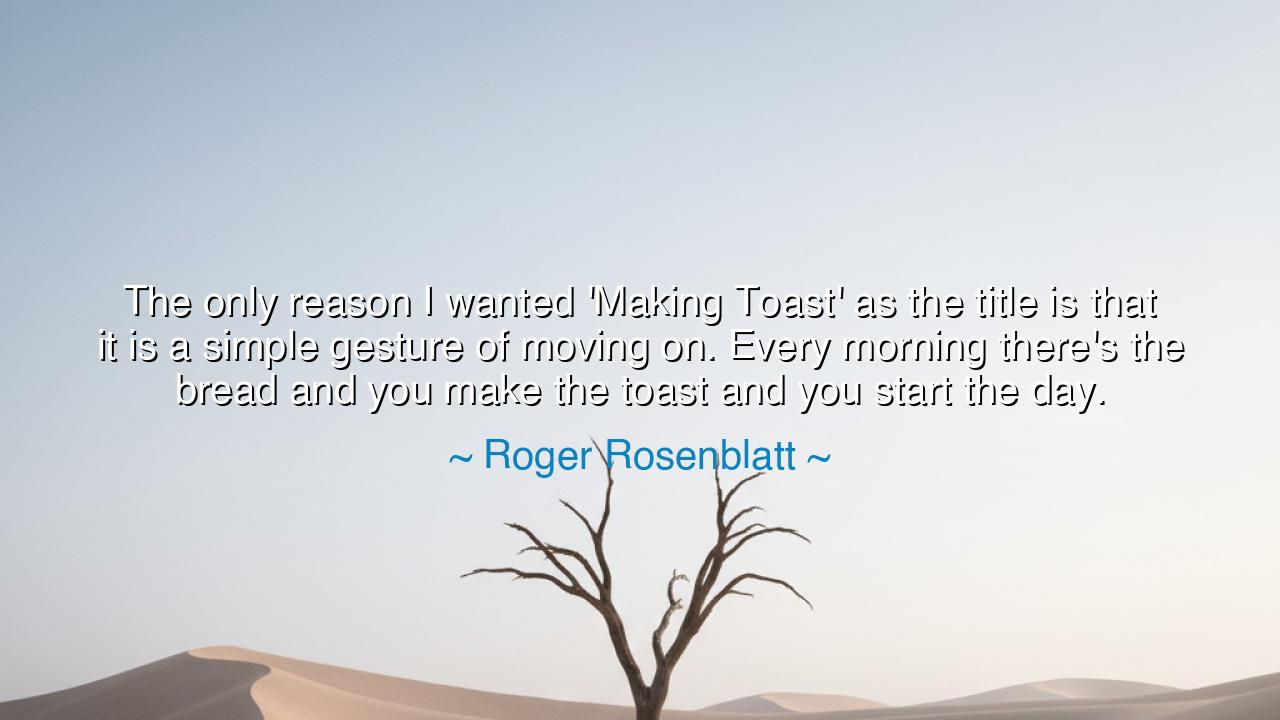
The only reason I wanted 'Making Toast' as the title is that it
The only reason I wanted 'Making Toast' as the title is that it is a simple gesture of moving on. Every morning there's the bread and you make the toast and you start the day.






The words of Roger Rosenblatt — “The only reason I wanted Making Toast as the title is that it is a simple gesture of moving on. Every morning there’s the bread and you make the toast and you start the day.” — carry the weight of quiet sorrow and profound endurance. They were born from grief, for Rosenblatt wrote of caring for his grandchildren after the sudden death of his daughter. Yet in these simple lines, he reveals a truth older than time: that in the smallest gestures of daily life, the soul finds its way back into the rhythm of existence.
The act of making toast is ordinary, humble, unremarkable — yet therein lies its power. For when the heart is crushed by grief or trial, it is not grand speeches or mighty acts that heal us, but the return to small duties, repeated with patience. The bread is there, the hand lifts it, the toaster hums, and the day begins anew. Such tasks, though simple, become sacred rituals of moving on, guiding us step by step out of despair and into the light of continuity.
The ancients knew this. After great mourning, communities often turned to rituals — the lighting of lamps, the offering of food, the pouring of libations. These gestures were not meant to erase pain, but to carry the grieving through it, to remind them that life flows on, and they must flow with it. Just as Rosenblatt speaks of toast as a beginning each morning, so the Greeks and Romans understood that daily rites anchor the spirit when it is lost in the tempest of sorrow.
History offers us another mirror in the life of Mahatma Gandhi. When India was reeling under oppression, he did not begin with grand declarations alone, but with the small, repetitive act of spinning cotton on the charkha. To outsiders, it seemed trivial, but to Gandhi and his people, it became a ritual of resilience, a sign of self-reliance, a daily discipline that pointed toward freedom. Like making toast, it was a humble act that bore the weight of a nation’s hope for moving on from bondage to liberty.
Rosenblatt’s choice of title reminds us that moving on does not mean forgetting, nor does it mean denying sorrow. It means accepting that life calls us each morning to rise again, to break bread, to tend to those who remain, and to carry forward love through action. The toast is not just food; it is a metaphor for survival, for choosing life one day at a time. Each slice lifted is a small act of defiance against despair.
The lesson is clear: when crushed by hardship, do not seek immediate healing in grand victories or sweeping changes. Instead, embrace the small gestures of daily living. Cook a meal. Water a plant. Write a few lines. These simple acts remind us that the world still turns, that we still belong to it, and that life still has meaning beyond grief. By repeating them, the soul slowly mends, and the dawn returns.
Practical wisdom follows. In your darkest moments, choose one small ritual — a cup of tea, a walk at sunrise, a page of reading, or, like Rosenblatt, making toast. Let it become your anchor. Do not rush to escape pain, but let the rhythm of small duties guide you gently forward. With time, these rituals become stepping stones across the river of sorrow, carrying you into the land of renewal.
Thus, Rosenblatt’s words endure as a quiet anthem of survival: the bread, the toast, the day. In the ordinary lies the strength to endure the extraordinary. In the small, repeated act lies the courage to live again. Let us remember that even when hearts are broken, hands can still make toast — and in that gesture is the first spark of hope, the first whisper of a new beginning.






AAdministratorAdministrator
Welcome, honored guests. Please leave a comment, we will respond soon